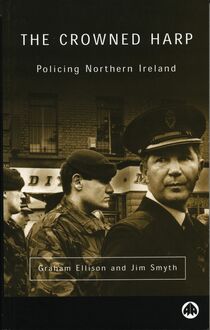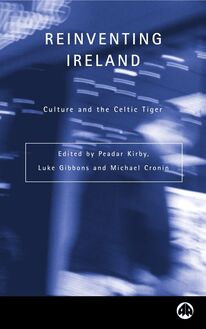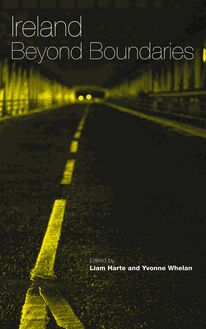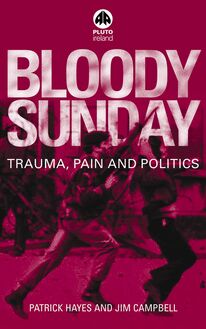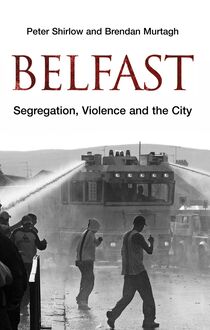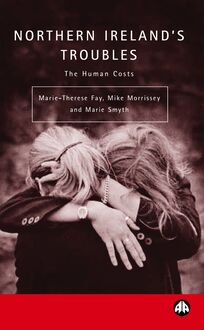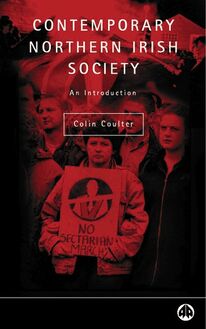Belfast , livre ebook
214
pages
English
Ebooks
2006
Obtenez un accès à la bibliothèque pour le consulter en ligne En savoir plus
Découvre YouScribe et accède à tout notre catalogue !
Découvre YouScribe et accède à tout notre catalogue !
214
pages
English
Ebooks
2006
Obtenez un accès à la bibliothèque pour le consulter en ligne En savoir plus
Publié par
Date de parution
20 mai 2006
Nombre de lectures
2
EAN13
9781849642064
Langue
English
Poids de l'ouvrage
1 Mo
It is a commonly held view that the city of Belfast is emerging out of conflict and into a new era of tolerance and transformation. This book challenges this viewpoint. The authors pinpoint how international peace accords, such as the Belfast Agreement, are gradually eroded as conflict shifts into a stale and repetitive pattern of ethnically-divided competition over resources.
This book is a vivid portrait of how segregation, lived experience and fear are linked in a manner that undermines democratic accountability. It argues that the control of place remains the most important weapon in the politicisation of communities and the reproduction of political violence. Segregation provides the laboratory within which sectarianism continues to grow.
Acknowledgements
1. Introduction
2. Even in Death Do us Stay Apart
3. The Belfast Disagreement
4. Interfacing, Violence and Wicked Problems
5. Between Segregated Communities
6. Coasting in the other city
7. Ethnic poker: policy and the divided city
8. Conclusion
References
Index
Publié par
Date de parution
20 mai 2006
EAN13
9781849642064
Langue
English
Poids de l'ouvrage
1 Mo
Belfast
Segregation, Violence and the City
PETER SHIRLOW
and
BRENDAN MURTAGH
Pluto P Press
LONDON DUBLIN ANN ARBOR, MI
SShirlow 00 pre iiihirlow 00 pre iii 44/4/06 11:45:55/4/06 11:45:55First published 2006 by Pluto Press
345 Archway Road, London N6 5AA
and 839 Greene Street, Ann Arbor, MI 48106
Distributed in the Republic of Ireland and Northern Ireland by
Gill & Macmillan Distribution, Hume Avenue, Park West, Dublin 12.
Tel: + 353 1 500 9599. e-mail: sales@gillmacmillan.ie
www.plutobooks.com
Copyright © Peter Shirlow and Brendan Murtagh 2006
John Hewitt, ‘The Coasters’, is from P. Fiacc (ed.), The Wearing of the Black:
An Anthology of Contemporary Ulster Poetry, Belfast: Blackstaff Press, 1974.
Reproduced by permission of Blackstaff Press on behalf of the Estate of John Hewitt.
The right of Peter Shirlow and Brendan Murtagh to be identifi ed as the authors of
this work has been asserted by them in accordance with the Copyright, Designs and
Patents Act 1988.
British Library Cataloguing in Publication Data
A catalogue record for this book is available from the British Library
ISBN 0 7453 2481 9 hardback0 7480 0 paperback
Library of Congress Cataloging in Publication Data applied for
10 9 8 7 6 5 4 3 2 1
Designed and produced for Pluto Press by
Chase Publishing Services Ltd, Fortescue, Sidmouth, EX10 9QG, England
Typeset from disk by Stanford DTP Services, Northampton, England
Printed and bound in the European Union by
Antony Rowe Ltd, Chippenham and Eastbourne, England
SShirlow 00 pre ivhirlow 00 pre iv 44/4/06 11:45:55/4/06 11:45:55Contents
List of Tables, Figures and Maps vi
Acknowledgements viii
Introduction 1
1 Even in Death Do Us Stay Apart 13
2 The Belfast Disagreement 32
3 Interfacing, Violence and Wicked Problems 57
4 Between Segregated Communities 81
5 Coasting in the Other City 101
6 Workspaces, Segregation and Mixing 124
7 Ethnic Poker: Policy and the Divided City 143
8 Conclusion 171
Notes 182
References 184
Index 196
SShirlow 00 pre vhirlow 00 pre v 4/4/06 11:45:564/4/06 11:45:56Tables, Figures and Maps
TABLES
2.1 Westminster vote 1997 and 2005 47
2.2 Punishment attacks in Northern Ireland 1994–2004 52
2.3 Politically motivated deaths in Northern Ireland
1994–April 2005 53
2.4
1983–93 53
2.5 Shooting and bombing incidents 1994–2004 54
2.6 Shooting and bombing incidents 1983–93 55
2.7 Profi le of intimidation cases by Housing Management
District 55
3.1 Segregation in Belfast by community background 60
3.2 Physical interfaces in Belfast at 2005 62
3.3 Policy costs of interfacing 64
3.4 Relationship between politically motivated deaths
and interfaces 73
3.5 Victim by type and location 1968–2005 73
4.1 Percentage share of those who do not use facilities
in areas located in the other community by age and
reason 86
4.2 Consumption activities and distance travelled in
Ardoyne and Upper Ardoyne 87
4.3
Oldpark, Manor Street, Short Strand and
Ballymacarrett 89
4.4 Perceptions of changes in volume of violence and
antisocial behaviour since 1994 93
4.5 How safe do you feel when walking through your
local area when dark? 94
4.6
local area during the marching season? 94
4.7 How safe do you feel when walking through an area
dominated by the opposite religion during the day? 95
5.1 Comparison in agreement variables 112
5.2 Variance explained 114
5.3 Component matrix for Northern Ireland and COSE 114
vi
SShirlow 00 pre vihirlow 00 pre vi 44/4/06 11:45:56/4/06 11:45:56Contents vii
5.4 Cultural activity by religion 115
5.5 Social capital and activity by head of household and
partner: sports 116
5.6
partner: religion 116
5.7
partner: social 117
5.8
partner: professional 117
5.9 Variations between activity and destination 118
5.10 Social capital and activity by eldest child 120
5.11 Social capital by religion of destination for eldest child 120
5.12 Correlation analysis between children’s activity and
destination 121
5.13 Variations between children’s activity and destination 122
6.1a Percentage share by workplace segregation and religion
in private sector companies in Northern Ireland 2003 134
6.2b Percentage share by workplace segregation and share
of employment within predominantly Protestant
private sector companies in Northern Ireland 2003 134
6.2c Per
of employment within predominantly Catholic 134
7.1 Policy, politics and land 149
7.2 RDS and community cohesion 152
7.3 PEACE II Neighbourhoods under Measure 2.11 154
7.4 Common Ground Consortium 162
7.5 Spatial housing strategy and community divisions 164
7.6 Competed developments and costs to 2005 167
FIGURES
3.1 Interfaces in context 63
3.2 Distance between location of confl ict-related fatalities
and the victim’s home in Belfast 1966–2004 74
5.1 Area of housing search 111
MAPS
3.1 Prominent interfaces, segregation and politically
motivated deaths in Belfast 1969–October 2005 61
4.1 Segregation, facilities and the two Ardoynes 88
SShirlow 00 pre viihirlow 00 pre vii 4/4/06 11:45:564/4/06 11:45:56Acknowledgements
We would like to thank our respective colleagues in the School of
Environmental Sciences (University of Ulster) and the School of
Environmental Planning (Queen’s University Belfast). In particular
we thank those who have aided us with a series of insights and
recommendations as well as their genuine interest in what we
were aiming to achieve: Brian Graham, Jon Tonge, Kieran McEvoy,
Dawn Purvis, Michael Murray, Mickey Liggett, Rab McCallum, Billy
Mitchell, Chris O’Halloran, Paul Donnelly, Rachel Monaghan, Paul
O’Neil, Victor Mesev, Andy Wood, Mike Raco, Nick Phelps, Martin
Jones, Rachel Pain, Tommy Quigley, Tom Roberts, Tim Smyth, Adrian
Geulke, Jim Smyth, Mike Morrissey, Mike Poole, Shirley Morrow,
Dave Eastwood, Bill Neill, John O’Farrell, Ann Mallon, Paul Moss,
Ed Cairns, Alan Bairner, Ken Reid, Jim McAuley, Claire Mitchell,
Wayne Foord, Charlotte Cox, Joe McGrath, Henry McDonald and
Jean Brown.
We would also like to thank the editors of Regional Studies, Urban
Studies and Ethnopolitics, who published previous work upon which
many of the arguments made within this book are based. In particular,
we wish to highlight our appreciation to them with regard to the
reproduction of some of the maps, data and other material. Without
such support it is always diffi cult to try out novel ideas and to have
the opportunity to work on them. Special thanks to Vincent Gribbin,
Dennis McCoy and Stephen Donnelly from OFM/DFM–Equality Unit
for sponsoring our various projects on segregation, as well as staff
at the Northern Ireland Housing Executive, in particular, Joe Frey.
Community groups throughout Belfast have also provided support
and encouragement, as have each of the political parties.
Special thanks to the thousands of people who have completed
surveys over the years and who have also provided insights from
the doorstep and in the parlour. Those who gave us interview
material are also to be praised. Many emotive and heart-rending
events were recounted by these people. We hope that this book will
help create a wider appreciation of the diffi cult situation that many
people in Belfast endure on a daily basis. A fi nal thanks to Oonagh
and Eilish.
viii
SShirlow 00 pre viiihirlow 00 pre viii 44/4/06 11:45:56/4/06 11:45:56Introduction
The poet W.B. Yeats’s famous line ‘for peace comes dropping
slow’ was long a valid interpretation of the sloth-like pursuit of
confl ict transformation in Northern Ireland. In 1994 when the fi rst
paramilitary ceasefi res were called there was a sense that the ‘weight
of the world’ had been removed from the shoulders of the people of
Northern Ireland. There was a genuine sense of relief as people viewed
the future with a sense of optimism and hopefulness. Eleven years
later the Provisional Irish Republican Army (PIRA) decommissioned
in a period in which that sense of hope had slowly shifted towards
grimace, foreboding and denial regarding the political progress that
had been made. During that period of peace-building rioting, petrol
bombing and violence had returned in a manner that suggested
that the possibility of meaningful civil and political change had
been neutered.
In reality, much had changed. There was a new and far from
aggressive relationship between the two states and the experiment
in devolution had shown signs of a capacity to share power. But
on other levels it appeared as though the division between groups
remained and, if anything, as argued within this book, the capacity to
engender ethno-sectarian atavism has increased. But why would that
be the case? How could a peace process lead to a decline in a middle
ground within Northern Irish society? Why did peace-building fail
to challenge the nature and practice of segregated living?
We aim to answer such questions by highlighting how the meaning
of segregation undermines the capacity to shift society onwards.
Place is crucial in the reproduction of violence and is as important as
ideology itself within confl ictual societies. Segregated places are the
sites of social exclusion, fatalism and economic truncation. They are
also the places within which resistance against economic, social and
cultural ‘others’ is commonplace. The merging of people with shared
visions and beliefs, whether imagined or real, into segregated places
provides the capacity to fortify togetherness and identity. Ultimately,
segregated places are important because they contain the power to
subvert and transcend conventional practices and beliefs. Segregated
places are a reminder of how conventional society has failed to deliver
equality and support for the wider notion of the democratic nation.
1
SShirlow 01 intro 1hirlow 01 intro 1 44/4/06 11:46:09/4/06 11:46:092 Belfast
Belfast’s segregated places are important because they are the sites
within which the most passionate renditions of difference are played
out and managed. In simple terms Belf
